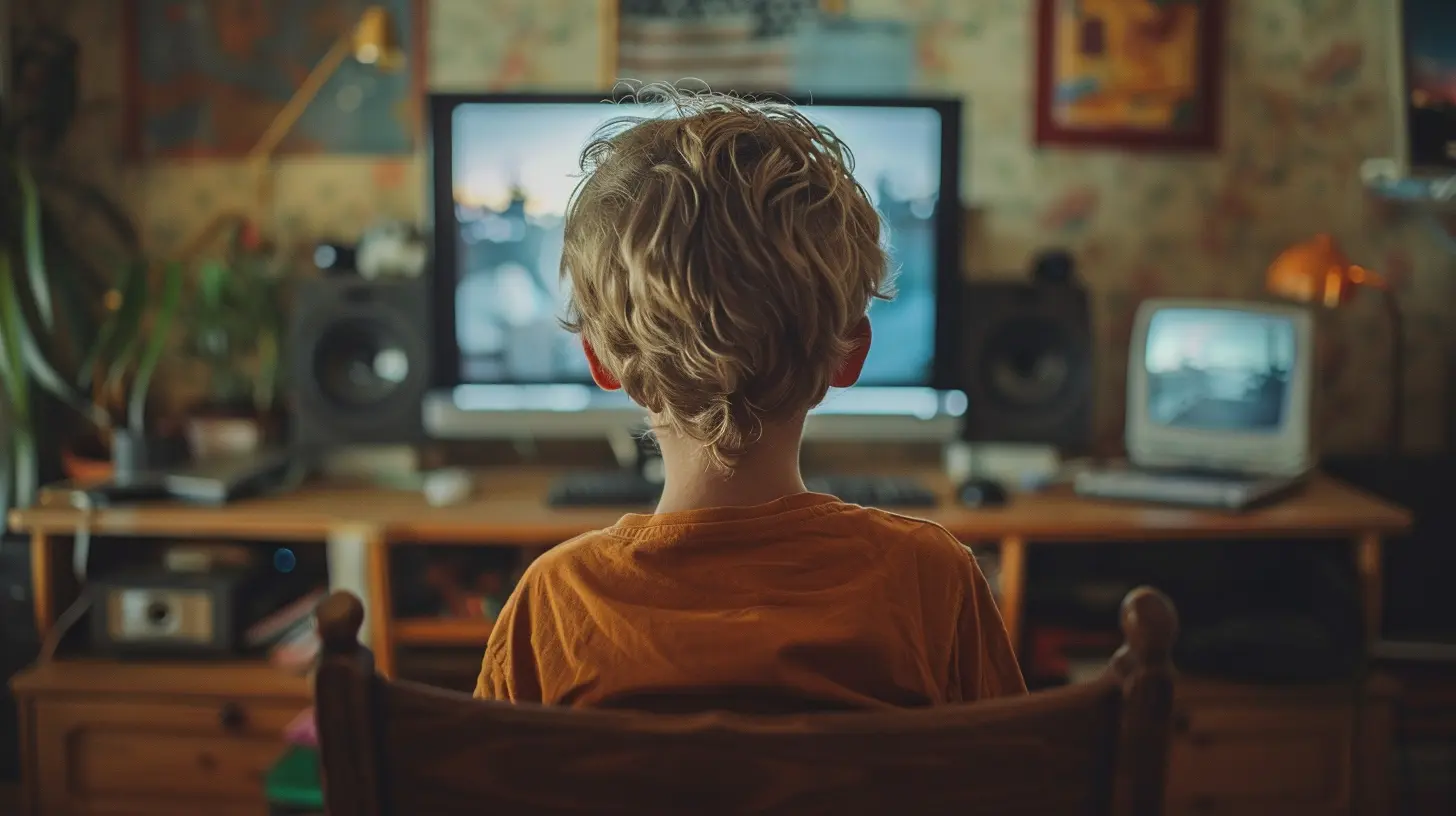Managing Screen Time Without the Drama
23 February 2025
Let's face it—managing screen time in today's tech-obsessed world can feel like a never-ending battle. Whether it's Fortnite, TikTok, YouTube, or yet another Netflix binge, our kids are growing up in a digital age that's both empowering and frightening. But how do we, as parents, enforce screen time restrictions without spiraling into a full-blown family feud? Spoiler alert: It’s possible! Drama-free screen time management is within your reach.
In this article, we'll explore practical tips to help you set healthy boundaries without becoming the villain in your household. The best part? You can implement these strategies today, and no, it doesn’t mean you have to turn your home into a tech-free monastery.

Why Is Screen Time Such a Battleground?
Before we dive into ways to manage screen time, let’s address why it’s such a hot-button issue in the first place. It's no secret that screens are everywhere. From smartphones to gaming consoles to tablets, devices are almost an extension of our children's hands.The instant gratification that screens offer—whether it’s from leveling up in a video game, watching funny cat videos, or snapping photos on social media—makes it hard for kids to tear themselves away. It triggers a dopamine rush, making screens irresistibly captivating.
But as parents, we know the flip side. Too much screen time can lead to problems like sleep disruption, poor academic performance, and even behavioral issues. It’s not that screens are inherently evil, but like anything, moderation is key. Unfortunately, getting kids to understand this balance isn’t always straightforward.

Understanding the Psychological Pull of Screen Time
To better manage screen time, it helps to get inside our kids' heads for a minute. When kids spend hours glued to their devices, it’s not because they don’t respect us or enjoy spending time with family. They’re engaging in something that offers instant rewards and sensory overload. It’s biologically hard to resist.Instead of focusing on punishing or restricting screen time, think of it like managing sugar consumption. You wouldn’t ban sweets outright, but you would set limits based on what's healthy, right?
Similarly, it’s about teaching our kids how to have a balanced "digital diet." When they understand that screen time has its place, but shouldn’t replace other important activities like playing outside, reading, or hanging out with the family, they’re more likely to cooperate.

Establishing Ground Rules Early On
The key to avoiding drama is setting expectations before screen time becomes a habit. If you have younger kids, consider yourself lucky—you can set the precedent before they start demanding hours of Minecraft! For older kids or teens, the transition might be a bit rockier, but don’t give up hope. It’s never too late to introduce boundaries.1. Create a Screen-Time Schedule
Just like with bedtime or mealtimes, having a set screen-time schedule can keep things under control. Whether it's an hour after school or some extra time on weekends, defining when and how much screen time is allowed ahead of time helps prevent arguments later on.Make sure your schedule is realistic. If your child’s schedule includes designated homework time or extracurricular activities, allow some flexibility, but maintain a consistent structure.
2. Involve Your Kids in the Decision-Making Process
No one likes being dictated to—especially children. Involving them in screen time decisions can make them feel empowered and more likely to follow the rules. Ask them to help create the "screen-time" schedule. By granting them some autonomy, you’re also teaching negotiation and self-regulation.3. Set Up Tech-Free Zones
Designate certain areas of the house as screen-free zones. Bedrooms and dinner tables are great places to start. This ensures that screens don’t interfere with essential activities like sleep and family bonding time.Want extra buy-in? Make it a house rule that adults follow the "tech-free zone" rule too. If your child sees you scrolling through Instagram over dinner, they’ll think the rule doesn't apply to everyone.

Use Screen Time as a Learning Tool
Not all screen time is created equal. Watching hours of unboxing videos? Not super productive. But using a tablet to complete a math game? That’s something you can feel better about allowing for an extended period.4. Encourage Educational Activities
Turn screen time into a positive experience by guiding your child towards educational content. There are so many apps and games that promote creativity, problem-solving, and learning. Use this to your advantage! Just because they're staring at a screen doesn't mean they aren't absorbing valuable information.5. Set a Strong Example
Kids naturally copy what they see. If you’re constantly glued to your phone, your child will think it’s okay to do the same. Set a strong example by limiting your own screen time and engaging in other activities.Model healthy screen usage by doing things like digital detox evenings where the family puts all screens away to enjoy a board game or movie together.
Handling Screen Time Meltdowns (Without Losing Your Cool)
Even if you’ve set clear rules, there will be moments when your child pushes back. You can have the best-laid plans, but at some point, your child will likely throw a tantrum or beg for “just 10 more minutes.” This is where it’s essential to stay calm and consistent.6. Automate Cut-Offs
Technology is a beautiful thing—why not use it to manage tech? Most devices now have settings that can automatically restrict usage. Smartphones have built-in tools like Apple’s Screen Time or Android’s Digital Wellbeing to set app limits and downtime. Parents can also use parental control apps to lock screens after designated times.By taking yourself out of the enforcement process and letting the machine do the work, you prevent power struggles. If the screen goes dark because of a timer, there’s no room for debate!
7. Have a Pre-Warning System
Instead of abruptly turning off the screen mid-game or video, offer a heads-up. A simple "You’ve got 15 minutes left" or "Wrap up what you’re doing in 5 minutes" prepares your child for the inevitable shutdown. This reduces the shock factor and minimizes potential tantrums.Think of it like pulling up to a red light; you wouldn’t slam on the brakes without warning. The same should go for screen time.
Encourage Offline Alternatives
Half the battle of managing screen time is making sure there are plenty of engaging offline activities to fill the void. After all, if the alternative is boredom, it’s no wonder kids want to stay glued to their screens.8. Offer Engaging Activities
Encourage offline hobbies like drawing, playing board games, or building Lego towers. Organize playdates, take them on nature walks, or set up outdoor play options. The more alternatives your kids have, the less dependent they’ll be on screens for entertainment.9. Reward Non-Screen Activities
Positive reinforcement works wonders. Reward your child for sticking to their screen-time limits with non-screen-related rewards. Maybe it’s extra bedtime stories, a family outing, or letting them choose what you have for dinner.The idea is to associate non-screen activities with feelings of accomplishment and reward, rather than presenting them as "punishment."
Navigating Screen Time in a Socially Connected World
Let’s not ignore the elephant in the room: a big reason why kids want more screen time is so they can stay connected to their friends. In a world where hanging out often means playing games online or chatting over social media, cutting them off entirely isn’t practical—or fair.10. Find a Healthy Social Balance
Help your child understand the difference between healthy social interaction and screen dependence. Encourage face-to-face get-togethers whenever possible, but know that some online socializing is okay too.Set guidelines around social media and online gaming. Maybe you allow more screen time on weekends when friends are less accessible in person, but weekdays are reserved for in-person activities and homework.
11. Detach Screen Time from Rewards or Punishments
One of the biggest mistakes parents make is using screen time as a reward or punishment. This increases its power, making screens the "forbidden fruit." Instead, view it as just one of many daily activities that need balance. By removing the perception of screens as something to be earned, they become less of a coveted prize.
Conclusion: Striking the Right Balance
Managing screen time without the drama doesn’t have to be complicated. The key is creating a balance—one that works for both you and your children. It’s about negotiating, setting limits, and modeling good behavior. You can absolutely raise a tech-savvy kid who knows how to put down the controller and engage in the real world.Remember that consistency is your friend. Once the rules are in place, stick to them. Your child may test the boundaries, but that's just par for the course in parenting. With patience and the right strategies, you can turn the screen time battle into a distant memory—with zero drama.
all images in this post were generated using AI tools
Category:
Parenting ChallengesAuthor:

Noah Sawyer
Discussion
rate this article
11 comments
Kayla Fletcher
Managing screen time: like juggling flaming torches while riding a unicycle! Chaos, but entertaining!
March 20, 2025 at 5:35 PM

Noah Sawyer
Absolutely! Finding balance can feel like a circus act, but with the right strategies, it can be a fun and manageable experience.
Thea Whitaker
Beneath the glow of screens lies a world of secrets and distractions. Can we truly navigate this digital maze without losing sight of what matters most? The answer may surprise you.
March 18, 2025 at 3:24 AM

Noah Sawyer
Absolutely, managing screen time is about finding balance and prioritizing what truly matters in our lives.
Zaid Lambert
This article offers practical strategies for managing screen time without conflict. I appreciate the emphasis on open communication and setting clear boundaries. Balancing technology use can be challenging, but the tips provided make it easier to create a positive environment for both parents and children. Great insights!
March 16, 2025 at 4:56 PM

Noah Sawyer
Thank you for your thoughtful feedback! I'm glad you found the strategies helpful for fostering open communication and positive boundaries around screen time.
Ariella McCune
Empowering kids through balanced screen time strategies.
March 13, 2025 at 4:33 AM

Noah Sawyer
Absolutely! Empowering kids with balanced screen time helps them develop healthy habits and critical skills while enjoying their digital experiences.
Elowen Thomas
Thank you for sharing these practical tips on managing screen time. It’s refreshing to see such a balanced approach that focuses on communication and understanding rather than strict limitations. Looking forward to implementing these strategies in our household!
March 12, 2025 at 5:53 AM

Noah Sawyer
Thank you for your thoughtful feedback! I'm glad you found the tips helpful and I'm excited for you to implement them in your household!
Cambria Marks
Balance is key; establish clear boundaries to foster healthy tech habits.
March 11, 2025 at 4:01 AM

Noah Sawyer
Absolutely! Clear boundaries help create a healthy relationship with technology and reduce stress. Thank you for your insight!
Quentin McNulty
Thank you for this insightful article! Your practical tips on managing screen time resonate deeply with parents navigating the digital age. I appreciate the emphasis on open communication and setting clear boundaries, which can truly foster a healthier relationship with technology for our children. Looking forward to more advice!
March 6, 2025 at 4:08 AM

Noah Sawyer
Thank you for your kind words! I'm glad you found the article helpful. Stay tuned for more tips on navigating the digital landscape!
Bellamy Dillon
“Balance is key—set clear limits and encourage other activities to reduce screen time struggles.”
March 2, 2025 at 3:54 AM

Noah Sawyer
Absolutely! Establishing boundaries and promoting diverse activities are essential for healthier screen time habits.
Anisa McLean
Balance brings joy to parenting!
February 28, 2025 at 3:59 PM

Noah Sawyer
Absolutely! Balance is key to creating a harmonious environment for both parents and children.
Elise McGhee
What a fantastic guide! Balancing screen time is vital for our little ones. Your practical tips make it so much easier. Thank you for sharing such valuable insights with us!
February 28, 2025 at 3:22 AM

Noah Sawyer
Thank you for your kind words! I'm glad you found the tips helpful for managing screen time.
Azura Matthews
Great article! Striking a balance with screen time can be challenging, but your tips on setting clear boundaries and encouraging alternative activities are practical and relatable. It's all about fostering healthy habits without the stress. Thanks for sharing!
February 25, 2025 at 3:57 PM

Noah Sawyer
Thank you for your thoughtful feedback! I'm glad you found the tips helpful. Striking that balance is key for everyone!
MORE POSTS

The Art of Saying No: Teaching Kids Limits

Teaching ‘Personal Space’: Why Physical Boundaries Are Important

Navigating Teen Independence While Enforcing Boundaries

Practical Tips for Managing Meltdowns in Public Spaces

Cultivating a Growth Mindset in Your Children

The Importance of Self-Care for Busy Dads Juggling Career and Family

Handling Public Misbehaviors Without Shame

Dealing with Postpartum Fatigue and Newborn Care